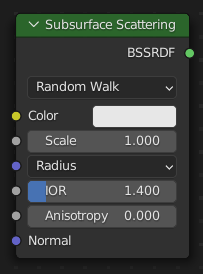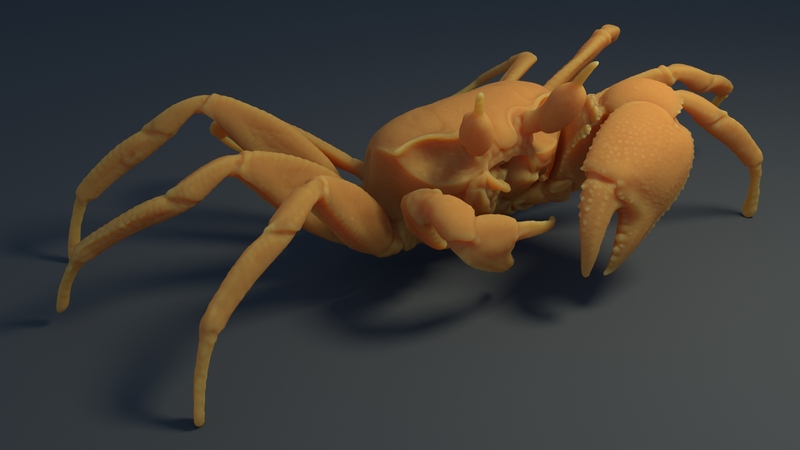Subsurface Scattering(SSS)

Subsurface Scattering (サブサーフェススキャタリング:SSS)ノードは、皮膚、ワックス、大理石、ミルクといった素材向けに、シンプルな表面下散乱を追加するために用います。これらの素材の場合、光は表面で直接反射するのではなく、表面を通して内部で反射してから、吸収されるか、近くのポイントから表面を離れていきます。
RGBカラーチャンネルごとに、平均の色のばらつきを設定できます。たとえば、肌の場合、赤い色がさらに分散し、独特な赤い色の影と柔らかな外観となります。
入力
- Color(カラー)
Color of the surface, or physically speaking, the probability that light is reflected for each wavelength.
- Scale(スケール)
散乱半径のグローバルスケール係数。
- Radius(半径)
光がサーフェスの下を散乱する平均距離。半径が大きいほど、光が影に流れ込み、オブジェクトを通過するため、柔らかな外観になります。散乱距離はRGBチャネルに対して個別に指定され、赤い光がより深く散乱する皮膚などのマテリアルをレンダリングします。X、Y、Zの値は、それぞれR、G、Bの値にマッピングされます。
- IOR Cycles Only
Index of refraction for Subsurface Scattering.
- Anisotropy Cycles Only
Controls the directionality of subsurface scattering.
- Normal(ノーマル)
Normal used for shading; if nothing is connected the default shading normal is used.
Properties(プロパティ)
- Subsurface Method
サブサーフェススキャタリングをシミュレートするレンダリング方法。
注釈
Eevee does use not support the Random Walk methods.
- Christensen-Burley:
An approximation to physically-based volume scattering. This method is less accurate than Random Walk however, in some situations this method will resolve noise faster.
- Random Walk (Fixed Radius):
Provides accurate results for thin and curved objects. Random Walk uses true volumetric scattering inside the mesh, which means that it works best for closed meshes. Overlapping faces and holes in the mesh can cause problems.
- Random Walk:
Behaves similarly to Random Walk (Fixed Radius) but modulates the Radius based on the Color, Anisotropy, and IOR. This method thereby attempts to retain greater surface detail and color than Random Walk (Fixed Radius).
出力
- BSSRDF (双方向散乱面反射率分布関数)
BSSRDF shader output.
例

Random walk subsurface scattering.